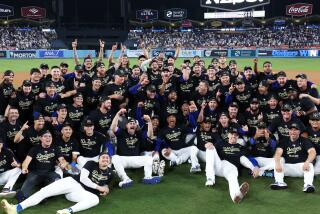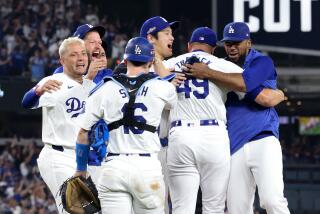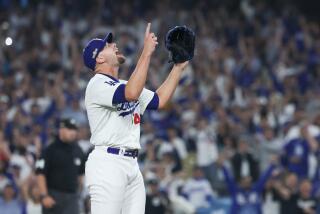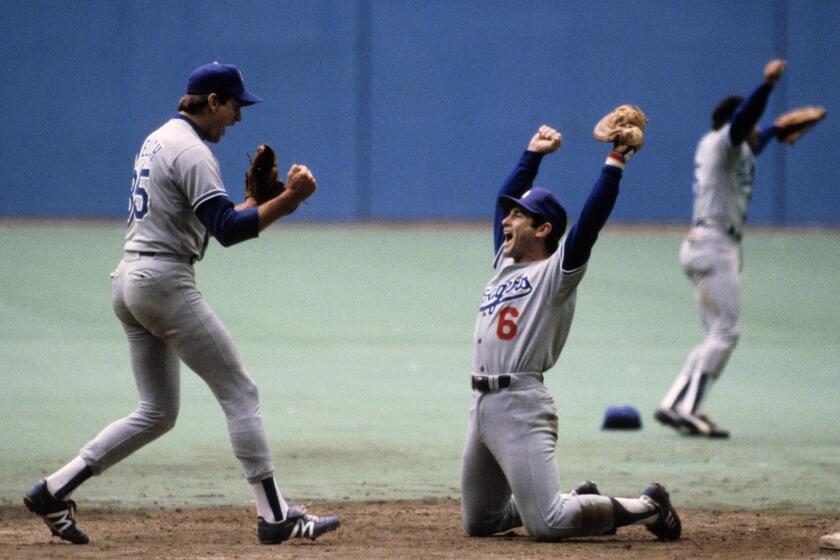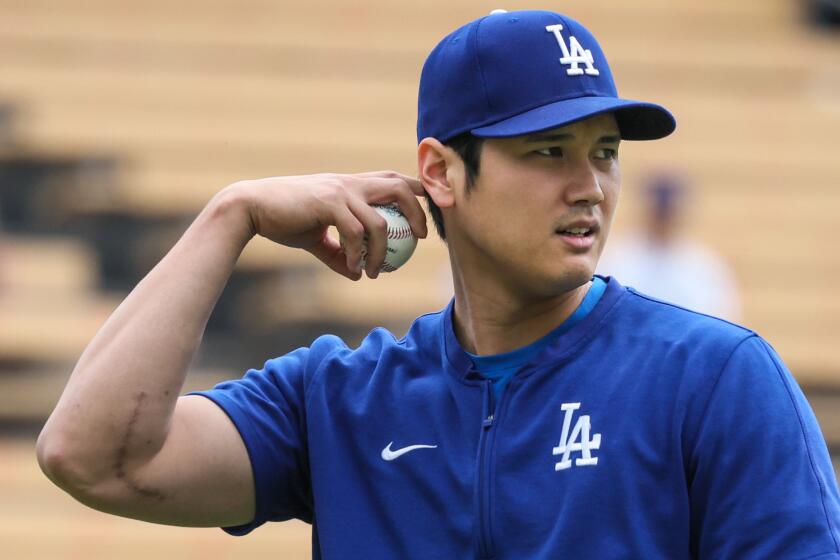Knife for Strawberry, Road for Samuel : Dodgers: Outfielder will undergo season-ending back surgery in August. Team releases second baseman before 6-5 victory over Padres.
The Dodgers’ 1992 season was finally rubbed out Thursday, as easily as Darryl Strawberry removed a tear from his cheek after announcing he would undergo season-ending back surgery.
“I’ve got a lot of fear,” Strawberry said.
Dr. Robert Watkins, the Dodgers back specialist, emphasized that Strawberry should be able to rejoin the team next spring with no further complications.
That cannot be said for second baseman Juan Samuel, who was waived Thursday.
The eventful day ended with the Dodgers starting an entire home-grown infield for one of the first times in 10 years during a 6-5 victory in 10 innings over the San Diego Padres before 35,961 at Dodger Stadium.
This lineup included second baseman Eric Young, who was making his major league debut at second base after being recalled to replace Samuel.
Young’s 10th-inning single, one of his two hits, moved Brett Butler to third base, from where he scored on a one-out sacrifice fly by Todd Benzinger to give the Dodgers their second consecutive victory.
“If a season like this can have a climax, then I guess this is the climax,” said Eric Davis, on the day’s activities. “Man, has this been crazy.”
Barring any unexpected trades by today’s deadline, the Dodgers will be spending the final 60 games playing prospects and drawing up blueprints.
“Now we have an opportunity to see if our youngsters can fulfill their promise,” Manager Tom Lasorda said. “It’s going to be interesting.”
Strawberry will be only a witness after agreeing with Watkins that his stiff back required a microscopic lumbar disectomy, a procedure to remove the fragments of a herniated disk in his lower back.
The hourlong procedure will take place at Centinela Hospital Medical Center in mid-August, and Strawberry’s rehabilitation will begin a month later.
“There is no hurry to operate right away,” Watkins said. “We are expecting a full and complete recovery by spring training.”
Watkins should know, because in 1989 he performed a nearly identical operation on Dave Winfield.
After missing a full season, Winfield returned to win comeback player of the year honors in 1990 by hitting a combined 21 home runs with 78 runs batted in for the New York Yankees and Angels.
Winfield was 38 at the time of his surgery. Strawberry is 30.
“Dave has done just great, and there is no reason to think Darryl can’t do the same thing,” Watkins said. “And Darryl has age in his favor.”
Shortstop Shawon Dunston of the Chicago Cubs had a similar back surgery in May and says he could be playing again by the end of the season.
None of this is consolation to Strawberry, who has spent most of the last two months working to avoid surgery.
When faced with the news Thursday, he retired to the training room and wept.
“It’s gotten to the point where I don’t have a choice,” Strawberry said. “It’s hard to believe.”
When Strawberry faced reporters, tears filled his eyes again.
“I don’t think anybody enjoys being cut on,” he said. “But this will help me back to swinging the bat like I did in the past.”
Strawberry first felt pain from the herniated disk on May 6 in Philadelphia, then went on the disabled list May 16.
“We have no idea what caused it, these things happen to many people all the time,” Watkins said at the time.
After missing 48 games, Strawberry attempted a return to the lineup July 6 but batted only .205 with no home runs and three RBIs in his first 12 games.
After a second exam Wednesday showed that the disk fragments had not grown smaller, Strawberry’s worst fears were realized.
Strawberry finishes his season hitting .237 with five home runs and 24 RBIs. For this, he was paid $3.75 million.
“Darryl is scared of it, and I’m scared for him,” Davis said. “Nobody in their right mind could go through this without being scared.”
One of players most hurt by Strawberry’s injury could be close friend Davis.
When Dodger officials meet to decide whether Davis should be offered a new contract, they will undoubtedly discuss the risks of having two outfielders with a history of medical problems.
If Davis’ inability to stay sound wasn’t an issue before, it probably is now.
“I am counting on Darryl to be my right fielder next year,” said Fred Claire, Dodger vice president, later adding, “But you can ignore the fact that he has had surgery.”
One player who won’t be the subject of debate this winter, for the first time in three years, is Samuel.
The Dodgers will have to eat the remainder of his $2.325-million contract if he clears waivers by next Wednesday, but they do it willingly.
He made the All-Star team last year with a .313 average and nine home runs at the break. But during the year since then, in 402 at-bats, he was batting .236 with three homers and 30 RBIs.
He has not hit a home run in 10 months, since Sept. 13, 1991. He had started only two games since the All-Star break.
Samuel packed and left the clubhouse shortly after his release Thursday morning.
“It was time to make the move, and everybody recognized that, including Juan,” Claire said. “We wanted to get Eric up here and get him some playing time.”
Young, a converted outfielder who is one of the Dodgers’ quickest prospects, was recently voted the top defensive second baseman in the Pacific Coast League in one poll, despite 20 errors. He was hitting .337 with 28 stolen bases in 94 games at Albuquerque.
“I have been given a really good chance, and I want to show them I can be the guy,” Young said.
Young was one of the early Dodgers heroes Thursday, turning two double plays in the first seven innings while driving in the tying run in the seventh with his first major league hit.
The Dodgers took a 1-0 lead in the fourth after Eric Karros walked and eventually scored on wild pitch from Padre starter Craig Lefferts.
The Padres came back to take a 3-1 lead in the top of the sixth on three unearned runs after Jose Offerman made his fourth error in five games on a two-out grounder by Darrin Jackson.
That led to a run-scoring single by Benito Santiago and a two-run triple by Jerald Clark.
The Dodgers regained the lead in the bottom of the sixth on Karros’ two-run double and a run-scoring single by Carlos Hernandez.
But then Ojeda left the game with a tender big toe, and in the top of the seventh Steve Wilson promptly gave up a two-run homer to Fred McGriff, his league-leading 21st.
The Dodgers tied it, 5-5, in the bottom of the seventh on Young’s two-out single after Butler, who earlier extended his hitting streak to 14 games, singled and stole second.
More to Read
Are you a true-blue fan?
Get our Dodgers Dugout newsletter for insights, news and much more.
You may occasionally receive promotional content from the Los Angeles Times.
